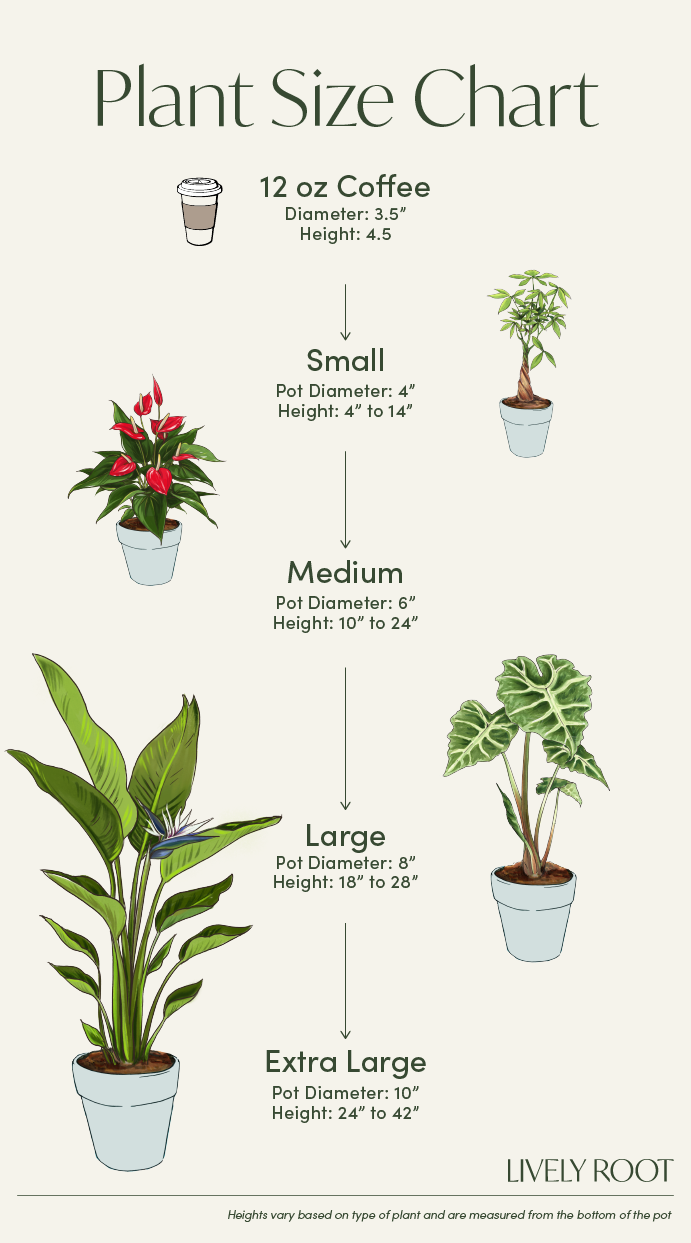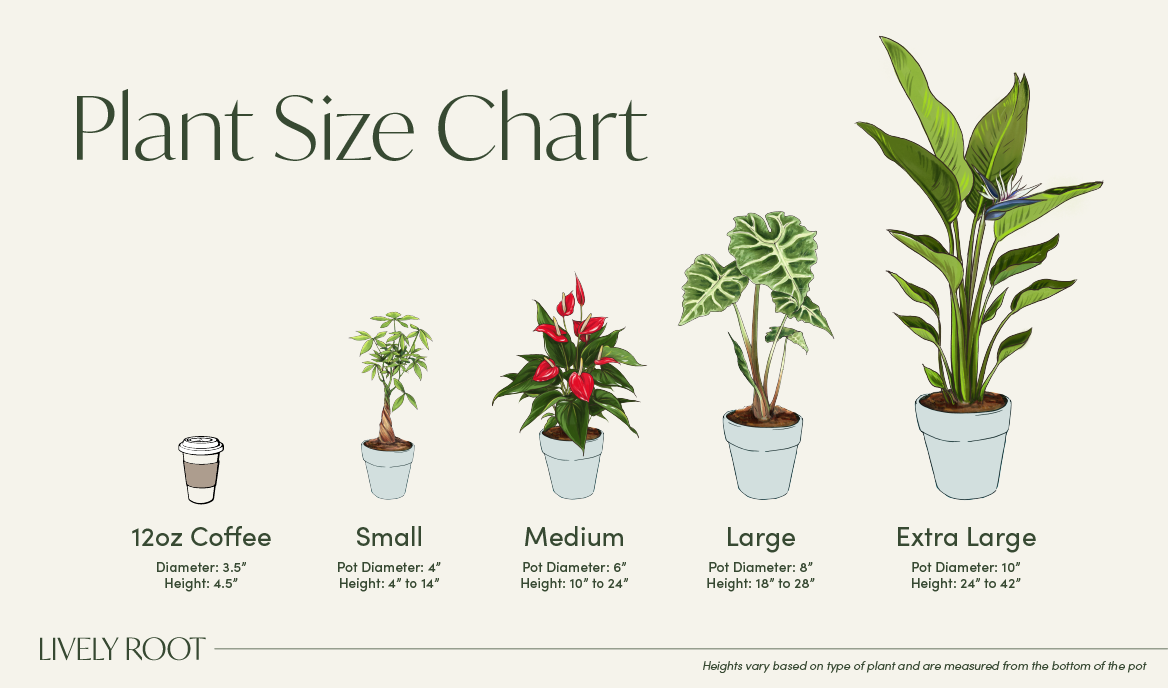

The Pomegranate Bush (Punica granatum), a stunning decorative plant that not only offers beautiful fall colors but also provides vibrant red blooms and the potential for small, ornamental fruit. This drought-tolerant compact variety is grown for it's size and beauty, different from the commercial fruit you are used to. Its lush foliage transitions from bright green to rich autumn shades, making it a striking addition to your indoor or outdoor garden.
Pomegranate Bush Care & Buying Guide

This plant thrives in bright sunlight and needs at least 6 hours of direct light daily to bloom fully. In regions with intense heat, partial afternoon shade can prevent the plant from overheating.
The Ornamental Pomegranate Bush is drought-tolerant but performs best when watered regularly. Allow the soil to dry out between waterings to avoid root rot. Overwatering can cause the leaves to yellow and drop
The plant is adaptable to various humidity levels but does best in average household humidity (30-50%). High humidity isn't essential, but very dry air might cause leaves to dry out or curl.
The Ornamental Pomegranate Bush prefers warm temperatures. It can handle brief dips down to 40°F, but consistent cold temperatures below this range may damage the plant. In cooler climates, it should be brought indoors during the winter or kept in a greenhouse.
Feed with a balanced liquid fertilizer every 6-8 weeks during the growing season (spring through early fall). Reduce feeding during the winter months when the plant’s growth slows down.
To transplant into a garden container or the garden bed, water your plant the night before. If the soil is dry, water the plant and put her in bright, indirect light for a couple of days. When all danger of frost has passed, you can transition your plant slowly to more direct sunlight. For one to two weeks, start in the morning hours and gradually give it more direct sunshine each day. After increasing the time, this should acclimate to full sun for 6-8 hours per day. Next, dig the hole twice as wide as the grower pot and the same depth as the grower pot (not deeper). Remove the plant and center in the spot. Add rooting hormone around the roots of the plant. Water in the hole and let drain. If you have clay soils, add compost to enhance the soil consistency with the native soil. Fill around the plant with the combined mix and up to the top of its soil line. Tamp down with your hands to remove any air pockets. Water again around the drip line, being careful not to soak the leaves to help prevent fungus. Keep the soil moist like a wrung out sponge but not soggy to promote healthy root growth.
The Ornamental Pomegranate Bush requires little maintenance in terms of cleaning. Simply remove any dead or yellowing leaves, and prune lightly to shape the plant as needed.
Pomegranate Bush: Overview
The Pomegranate Bush (Punica granatum) is a vibrant, sun-loving plant known for its glossy green foliage and distinctive red-orange flowers, which give way to the iconic pomegranate fruit. A member of the Lythraceae family, it originates from the Mediterranean and Middle Eastern regions and is suited for hardiness zones 7-10.
Reaching a mature height of 6-10 feet, this bush can thrive as a large shrub or small tree. With moderate care needs, it is relatively low-maintenance and prefers full sunlight for optimal fruit production. The pomegranate is often associated with fertility, abundance, and prosperity and is non-toxic to pets, making it a safe choice for pet-friendly households.
Punica Granatum Pomegranate: Benefits
- Natural air-purifier
- Produces edible, antioxidant-rich fruit
- Beautiful ornamental plant with vibrant flowers
- Attracts pollinators like bees and butterflies
- Low-maintenance and drought-tolerant
Pomegranate Bush: Care Guide
The Pomegranate Bush is a moderately easy-care plant that flourishes in sunny, warm conditions. With proper attention to its basic care needs, it can thrive in both garden and container settings.
Watering & Humidity
Once established, the Punica granatum plant is relatively drought-tolerant but performs best with regular watering. Keep the soil evenly moist during the growing season, allowing the top layer to dry between waterings. These bushes can tolerate lower humidity levels, making them well-suited to drier climates.
Light & Temperature
As a sun-loving plant, the pomegranate bush requires full sunlight - at least 6-8 hours per day for optimal growth and fruit production. It prefers warm temperatures and can withstand high summer heat, though it may need protection if exposed to frost, especially in regions colder than zone 7.
Soil & Repotting
Plant in well-draining soil enriched with organic matter, as pomegranates do not tolerate water-logged roots. They prefer a slightly acidic to neutral pH. For container-grown pomegranates indoors or outdoors, repot every 2-3 years to refresh the soil and support growth.
Feeding, Pruning, & Cleaning
Apply a balanced fertilizer in spring and again in mid-summer to promote strong growth and fruiting. Prune lightly to shape and remove dead or overcrowded branches, ideally in late winter or early spring. Clean the leaves occasionally to remove dust and allow maximum light exposure.
Propagation & Common Issues
Propagate pomegranates via cuttings in early spring, as they root easily in warm soil. Watch for common issues, such as leaf yellowing, often due to overwatering, and aphids, which can be managed with insecticidal soap. Proper care and monitoring will help ensure a healthy, productive plant.
Pomegranate Bush Plant: Placement, Companion & Alternative Plants
The ornamental Pomegranate Bush makes a versatile addition to gardens and patios, providing both beauty and fruit. Its sun-loving nature makes it ideal for outdoor spaces where it can flourish in full sunlight.
Best Locations & Uses
- Perfect for sunny patios and decks, adding a vibrant touch with flowers and fruit
- Ideal for kitchen or edible gardens, providing fresh pomegranates seasonally
- Great for xeriscaping, as it’s drought-tolerant once established
- Suitable for outdoor container gardening in warmer climates
- Perfect choice for gardeners who enjoy an ornamental yet productive plant
Companion Plants
Pair the pomegranate Punica granatum with these companion plants to create a diverse and harmonious garden environment:
- Lavender (Lavandula stoechas 'Primavera'): The Lavender plant is drought-tolerant, making it an ideal companion for pomegranate.
- Rosemary Christmas Tree (Rrosmarinus officinalis): Thriving in similar sunny, dry conditions, Rosemary adds both fragrance and culinary benefits to the garden.
- Coffee Plant (Coffee arabica): The Coffee Plant exhibits attractive, glossy, dark green leaves and bears star-shaped, pleasantly scented white flowers.
Alternative Plants
Consider these alternatives, available on Lively Root for a similar blend of beauty and garden interest.
- Olive Tree (Olea europaea): The Olive Tree is a sun-loving, edible plant that brings a Mediterranean feel and is safe for pets.
- Ponytail Palm (Beaucarnea recurvata): With its unique, arching leaves and drought tolerance, the low-maintenance Ponytail Palm is perfect for pet-friendly spaces.
- Boston Fern (Nephrolepis exaltata): Thelush, air-purifying Boston Fern is a pet-safe fern, perfect for shaded outdoor areas or indoor décor.
Get the Gorgeous Pomegranate Bush for Sale From Lively Root Today
Bring home the beauty of the Pomegranate Bush. Order yours from Lively Root today and enhance your garden with vibrant color and fruit!
























